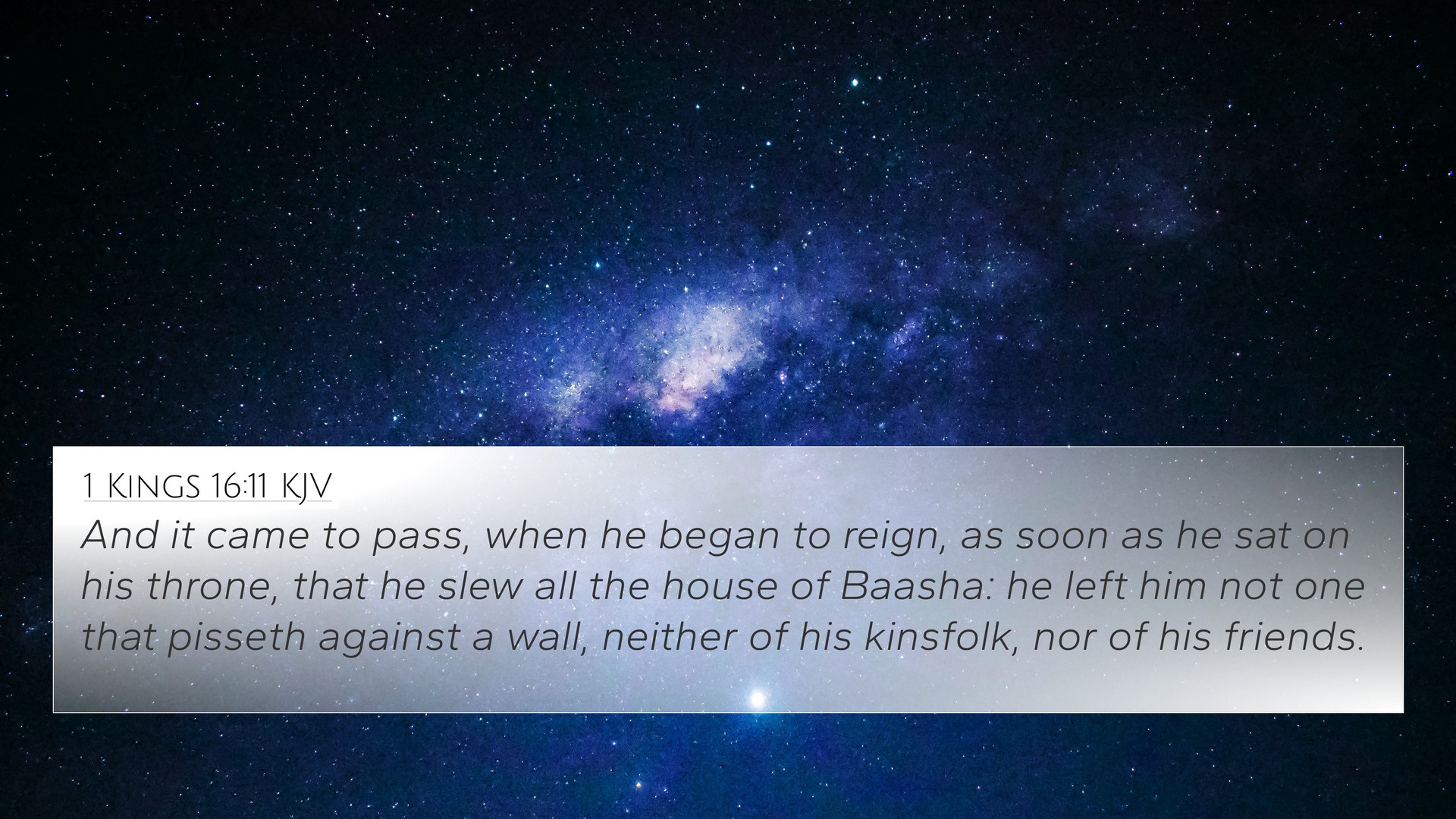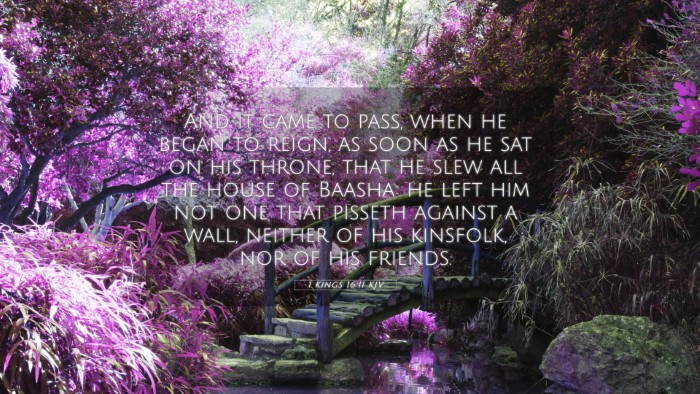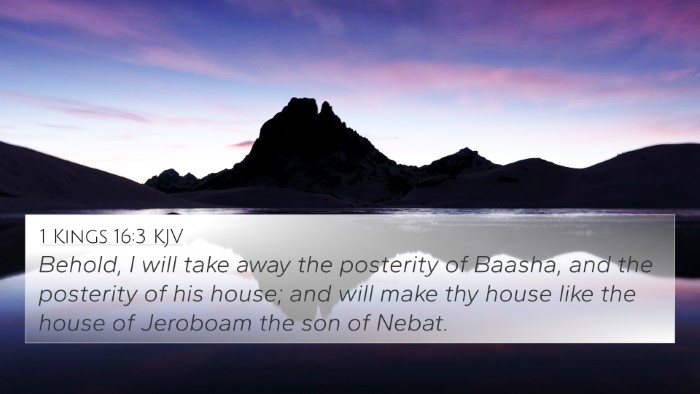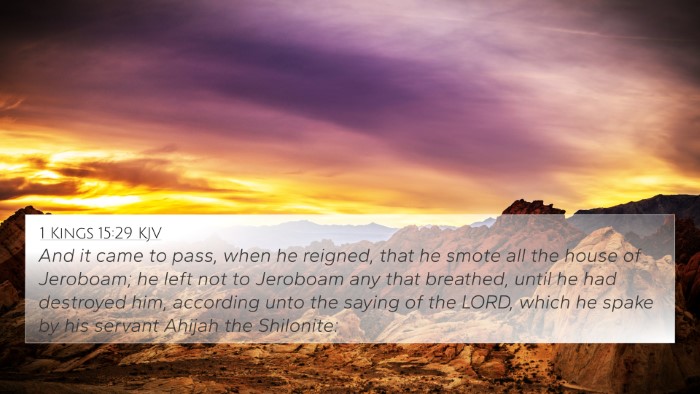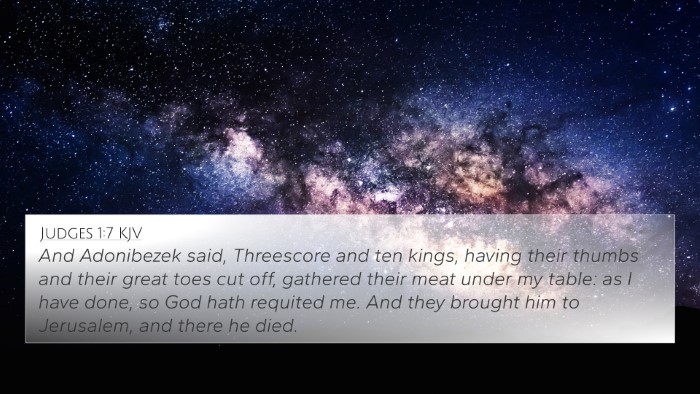Bible Verse Meaning: 1 Kings 16:11
Verse: "And it came to pass, when he began to reign, as soon as he sat on his throne, that he slew all the house of Baasha: he left him not one that pisseth against a wall, neither of his kinsfolk, nor of his friends."
Overview
This verse captures a significant moment in the biblical narrative as a new king, Zimri, ascends to the throne of Israel and enacts a brutal purge against the previous royal family, Baasha's household. The actions demonstrate the intense political maneuvering and violence characteristic of Israel's monarchy during this period. It's important to explore the implications of this verse, including the themes of judgment, divine sovereignty, and the consequences of sin.
Commentary Insights
-
Matthew Henry's Commentary:
Henry emphasizes the swift justice that was enacted by Zimri, interpreting this act as both a fulfillment of prophecy and a natural consequence of Baasha's sin against God's commandments. He notes that the phrase "pisseth against a wall" serves as a cultural idiom representing all male descendants, highlighting the totality of the destruction and God's judgment on the house of Baasha.
-
Albert Barnes' Notes:
Barnes provides context regarding Baasha's reign and his failures, claiming that the massacre reflects the cyclical nature of sin and retribution seen in the Israelite monarchy. He discusses how such actions are indicative of a larger divine plan and emphasizes the ruthlessness that defined Israel's political landscape during this time.
-
Adam Clarke's Commentary:
Clarke elaborates on the significance of Zimri's actions, linking them to the overarching theme of God's judgment against idolatry. He interprets Zimri's ascension and subsequent slaughter as a divine act against those who led Israel into sin, reiterating that no lineage receives impunity from divine justice. Clarke also examines the implications of familial ties and the political instability that results from such violent acts.
Thematic Connections
The verse connects strongly with themes of divine judgment, political upheaval, and the consequences of leading the people into idolatry. Below, we explore links to other scriptures that resonate with these themes:
- 1 Kings 15:27-30: Provides the background on Baasha, including his idolatry and the sins that led to divine judgment.
- 1 Kings 14:10: Another prophecy of judgment against houses that turn away from God.
- 2 Kings 9:7: Highlights the consequences of idolatry and the continuation of judgment against the house of Ahab.
- Jeremiah 11:6-8: Discusses the call for obedience to God's covenant and the resulting judgments for disobedience.
- Proverbs 16:12: Reflects on the nature of kings and rulers in the light of righteousness.
- Isaiah 10:1-4: Discusses woe upon those who decree unrighteousness, aligning with the harsh rule reflected in Zimri's actions.
- Matthew 26:52: Jesus' teaching about the consequences of violence, resonating with the legacy of violence seen in royal purges.
Cross-Referencing Biblical Texts
This verse serves as a point of reflection on how to engage in scriptural cross-referencing. Following are some potential tools for connecting this verse with others:
- Bible concordance: A useful resource for finding related phrases and themes across the biblical text.
- Bible cross-reference guide: Guides that help identify similar themes and teachings throughout Scripture.
- Cross-reference Bible study: Methods that allow a deeper exploration of interconnected biblical themes.
Practical Application
Understanding 1 Kings 16:11 involves recognizing the broader implications of divine justice in scripture. Readers can reflect on the following questions:
- What does Zimri's brutality tell us about the nature of human leadership apart from God?
- How can this passage inform our understanding of justice and mercy in contemporary contexts?
- What does it mean to be a leader in the light of God's sovereignty and judgment?
Conclusion
1 Kings 16:11 serves as a powerful reminder of the consequences of straying from divine principles. By exploring cross-references and connecting themes, readers can gain a deeper understanding of how this verse fits into the larger narrative of the Bible. Engaging with the tools for cross-referencing can enhance one's study of Scripture and reveal the profound connections between passages that speak to God's character and His justice.
